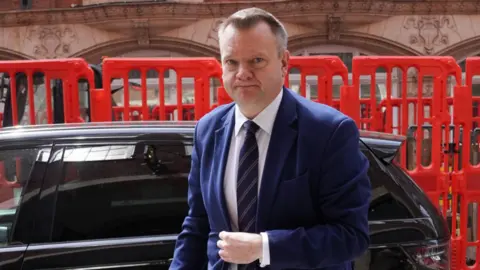In recent developments regarding travel between the UK and the EU, European relations minister Nick Thomas-Symonds has expressed an active interest in finalizing a deal that would allow UK passport holders to access European e-gates at airports. These automated gates expedite the process of passing through customs and immigration, significantly reducing wait times for travelers. Discussions are intensifying as the UK approaches its first bilateral summit with the EU since Brexit, scheduled for Monday. Thomas-Symonds emphasized that achieving such an agreement would contribute significantly to alleviating long border queues—making the travel experience smoother for Brits heading to and from Europe.
During an interview on the BBC’s “Sunday with Laura Kuenssberg,” Thomas-Symonds articulated his aspirations not only for improving crossing protocols but also for fostering a reciprocal understanding on youth mobility. He voiced confidence in the possibility of agreements that could lead to lower food prices by streamlining regulations and reducing bureaucratic hurdles, which would ultimately aid both consumers and suppliers in the UK.
However, there are concerns, as articulated by Conservative MP Alex Burghart, regarding the framework of negotiations. Burghart warned against the risk of the UK becoming a “rule taker” under new agreements with the EU, fostering a dependency on EU standards that many supported leaving the union to escape. He underscored the importance of ensuring that the UK maintains its regulatory independence, critiquing any notion of “dynamic alignment” where the UK would adhere to the EU’s evolving standards without a voice in their creation. Such an arrangement could compromise British sovereignty—a critical issue voiced by several politicians following the Brexit referendum.
Prime Minister Sir Keir Starmer described the upcoming summit as a historic occasion, highlighting the importance of collaborative talks, which will cover broad topics, including trade and security. As negotiations come to a head, Thomas-Symonds conveyed that discussions are in the “very final hours,” where economic revitalization and establishing stable borders remain paramount. Optimistically, he specified his goal was to ensure British travelers could use e-gates to bypass lengthy queues, stating that having more time for leisure or work would be an undeniably sensible goal.
Furthermore, there’s a pressing conversation surrounding the potential for a framework that would allow young people from the EU to live and work in the UK, and vice versa. Thomas-Symonds reassured the public that any negotiations would be structured around a “smart and controlled scheme,” firmly distancing such provisions from the concept of “freedom of movement” which remains a contentious issue for the government. While specific numerical caps or time limits for this potential program weren’t revealed, he emphasized that control over immigration remains a top priority.
In contrast, Liberal Democrat MP Calum Miller critiqued the government for not taking a more ambitious stance in rekindling EU relations. He suggested that moving toward a customs union could provide stability and reassurance for British businesses navigating the post-Brexit landscape.
The negotiations are not only about accessibility and movement; they represent an ongoing challenge to find a balance between cooperation with the EU while maintaining national sovereignty and control over domestic policies. As ministers like Thomas-Symonds push for these arrangements, the implications for British policy, immigration, and economic sectors hang in a precarious balance, awaiting resolution in the coming talks.



